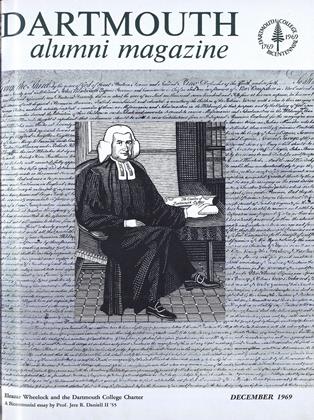By LeonardBaskin. Hanover: Dartmouth Publications,1969. 55 pp. $10.00.
Any Dartmouth man who wants to own, or give to others, some tangible evidence of a Dartmouth achievement should buy at least one copy of this book. Designed by one of Dartmouth's most admired professors, printed by a Dartmouth alumnus, inspired by a Dartmouth occasion, it is something in which to take great pride. Not only that, but it is a thing of beauty in itself, and is likely to be, therefore, a joy forever. And, given the quality of the printing and the excellence of the sixteen illustrations, it's a bargain.
As if that were not enough already, the book contains the printed version of the first Hamilton B. Mitchell Lecture on Printing and Graphic Arts, and a splendid lecture it is. Other people better qualified will doubtless deal in other places with whatever "ornaments of pedantry" (to use Mr. Baskin's phrase) the lecture may contain. My purpose is to try to convey the pleasure it gives.
The words please because they illuminate, because they penetrate, and because they cultivate. Any plough-like-flashlight could do as much, but few lectures do. What one sees is a fastidious and quirky intelligence at work, and one is encouraged to share what that intelligence and the eye of a man who is himself an etcher of importance have found in the works of five rather weird but wonderfully endowed graphic artists. The illustrations, wedded to the text, enable one to explore the etchers' special forms of deviance, at the same time as one enjoys the wide-ranging choice of telling phrases our guide uses to describe them: "aspects of the wondrous," "objects.. . transmogrified, metamorphosed and folded to enchantment," "blank space has been driven off," "compulsively dense," and a host of others. One has a sense of a style cunningly suited to its subject, a wealth of words to cover a wealth of work. When Mr. Baskin occasionally sounds rather pleased with himself, one reflects that he really has every right to, for he is doing a rare thing: convincingly sharing with others an experience and an enthusiastic response to it. In doing so he opens the eyes of his readers to the enchantment to be found in the works of his crazy colleagues, Duvet, Seghers, Vellert, Meryon, and Bresdin.
To all concerned, Mr. Baskin, Professor Nash, Rocky Stinehour, and to Mr. Mitchell for making it possible, heartfelt thanks.
Mr. Smith is the General Administrator ofHopkins Center.
 View Full Issue
View Full Issue
More From This Issue
-
 Feature
FeatureEleazar Wheelock and the Dartmouth College Charter
December 1969 By JERE R. DANIELL II '55, -
 Feature
FeatureEleazar: The Man Behind the Myth
December 1969 By John Hurd '21 -
 Feature
FeatureTHE WHEELOCK SUCCESSION
December 1969 -
 Feature
FeatureTV News Editor
December 1969 -
 Feature
FeatureMovie Producer
December 1969 By HAROLD BRAMAN '21 -
 Article
ArticleCharter of Dartmouth College
December 1969
PETER D. SMITH
Article
-
 Article
ArticleAMERICAN UNIVERSITY UNION MAKES REPORT ON STUDENTS
June 1924 -
 Article
ArticleStudents Start Publishing Firm
December 1947 -
 Article
ArticleNew Fund Secretary
October 1951 -
 Article
ArticleDivers Notes & Observations
December 1992 By "E. Wheelock" -
 Article
ArticleSOCIETIES
DECEMBER 1929 By Professor Edwin J. Bartlett -
 Article
ArticleD.O.G. Establishes Ski Museum
February 1937 By William B. Rotch ’37


